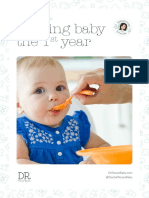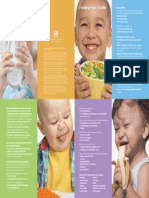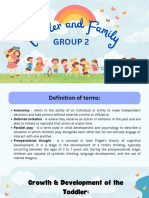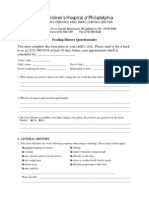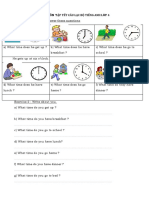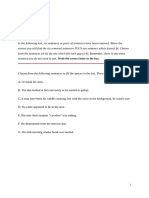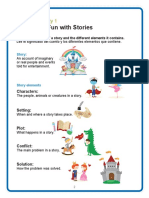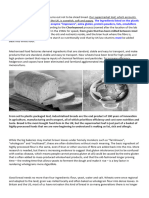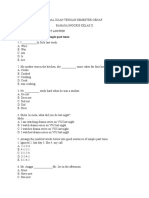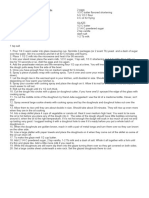Introducing Solids To Premature Babies: When To Start? How To Start?
Introducing Solids To Premature Babies: When To Start? How To Start?
Uploaded by
Nur imani ahmad puaadCopyright:
Available Formats
Introducing Solids To Premature Babies: When To Start? How To Start?
Introducing Solids To Premature Babies: When To Start? How To Start?
Uploaded by
Nur imani ahmad puaadOriginal Title
Copyright
Available Formats
Share this document
Did you find this document useful?
Is this content inappropriate?
Copyright:
Available Formats
Introducing Solids To Premature Babies: When To Start? How To Start?
Introducing Solids To Premature Babies: When To Start? How To Start?
Uploaded by
Nur imani ahmad puaadCopyright:
Available Formats
INTRODUCING SOLIDS TO
PREMATURE BABIES
Choosing the right time to introduce solids to premature babies can be confusing. In this fact
sheet we explain what you need to consider when introducing solids to your premature baby.
When to start? How to start?
Premature babies have different nutrition needs to Your baby will enjoy watching others eat. Shared
term babies. The current guidelines suggest starting meals with friends and family will help your baby
solids at around six months in full-term babies. learn about mealtimes.
However, this is not the same for premature babies.
When feeding, place your baby in a secure, upright
Introducing solids before your baby’s digestive position, so they can take food easily. It is okay to
system is ready may increase the risk of allergy. start by feeding baby on your lap; however, using a
If solids are started too late, your baby may be bouncer will allow you to make eye contact with
reluctant to accept new foods. There is also the risk your baby. Later on, place baby in a highchair with a
of anaemia as the baby’s iron stores run low. tray or a seat that attaches to the table so they can
feed themselves with their fingers.
Based on limited available evidence, a corrected
age of three months (the age from the expected due Make meal times pleasant. Choose a time for
date) is the appropriate time to consider the starting solids when you and your baby are happy
introduction of solids for premature babies. The and relaxed, such as mid-morning after a nap. In the
latest time to start is around seven months of actual beginning, offer solids after a breastfeed or formula
age (their age from birth or uncorrected age). so your baby is not too hungry.
As a general rule, most healthy premature babies Use a small plastic teaspoon and put the food in the
will be ready to start solids between five and seven middle of your baby’s tongue. Start with one or two
months (uncorrected age). The exact time within teaspoons and gradually build up the amount.
this two-month time period will depend on your
A lot of babies spit out food when it is offered for the
baby’s gestational age, developmental progress and
first time. If your baby becomes upset or frustrated,
when they show signs of readiness. For example, a
stop and try again in a few days.
baby born at 23 weeks might be ready to start solids
at seven months uncorrected age whereas a baby Playing with food is an important part of learning; so
born at 36 weeks may start at five months. prepare your baby and yourself for a bit of mess.
Using a clean, plastic sheet on the floor can be
Signs of readiness helpful especially when your baby starts finger food.
Before starting solids, your baby should show at
least some of the following signs:
First foods
Foods should be smooth and creamy with no lumps.
• Can sit in a supported position on your lap, Try one new food every two to three days.
bouncer or high chair.
Suggestions for nutritious first foods to offer your
• Can hold his or her head in a stable position.
baby include:
• Often puts hands or toys into their mouth.
• iron-fortified infant cereals
• Leans toward a spoon or food when it is offered
• pureed meat, chicken, fish, egg, beans/lentils or fish
and opens their mouth.
• pureed ripe avocado, apple, banana, potato,
sweet potato (choose one or two at a time).
INTRODUCING SOLIDS TO PREMATURE BABIES – JANUARY 2019 PAGE 1 OF 3
Introducing more foods and textures Home-made vs commercial baby foods
During the first few months of eating solids, breast Use homemade foods as often as possible. Shop-
milk or infant formula will continue to be your baby’s bought jars or pouches of baby foods can be useful
major source of nutrients. when out and about but they do not teach your baby
about the taste of individual foods. They are also
Within one to two weeks or when your baby is
more expensive and can contain less protein than
taking two to three teaspoons at a meal, you can
home cooked meals.
start to offer another meal at a different time of day.
Continue to offer iron-containing foods, more variety
Eating Issues
of fruit and vegetables, plain yoghurt and cow’s milk
on cereal or in cooking. Food refusal
Respond to your baby’s cues and don’t try to force
About one month after starting solids:
them to eat. Babies may refuse food for many
• Offer three solid meals per day reasons, such as if they are unwell, tired or teething.
• Introduce a cup for drinking (cooled, boiled water) Keep meal times to no longer than 30 minutes
• Add in soft finger foods and finely minced foods otherwise your baby may become restless and lose
About two months after starting solids: interest.
• Offer solids before a breast or bottle feed Signs that your baby has had enough include:
• Introduce cut up soft, minced or mashed food with • closing their mouth
small, soft lumps such as minced meat, egg or • pushing the spoon away or spitting food out
cooked lentils • turning their head away
• Offer other foods such as bread, pasta, • getting upset or crying.
dissolvable crackers, fine porridge, quinoa, rice
Between five to eight months old, babies are usually
and cheese
willing to try new flavours but can become more
Your baby will be able to chew soft food even if they reluctant as they get older. Offering new foods twice
do not yet have teeth. They may cough or gag a a week for at least five weeks will often lead to
little when starting lumpy food. This is a normal acceptance.
reaction for many babies trying new textures. Lumpy
Difficulty moving from smooth to lumpy textures
food should be introduced by nine months of age
(from their date of birth) at the latest. Some babies born prematurely have difficulty
accepting lumpy food, particularly if they had a long
As with full-term babies, the later a premature baby period of tube feeding. Try introducing lumpy food
is introduced to new tastes and textures the less gradually by increasing the thickness of purees and
likely they are to accept them. Babies need to slowly introducing soft lumps such as ripe mashed
explore, touch and taste new food at their own pace. banana or avocado.
Offer your baby a spoon at mealtimes even if you
continue to feed them with another spoon. Start Aim to give your baby food that has an even
giving your baby finger food and offer different consistency. For example, avoid smooth purees
flavoured foods separately so they can distinguish with floating lumps (common in commercial
between them. pouches) as the mixed textures may make your
baby gag or choke. Giving your baby home-cooked
Keep offering a variety of food to your baby so that food makes it easy to control the consistency.
by around one year of age they are eating all the
usual family food. Another way to introduce lumps to a reluctant feeder
is by offering finger foods. Babies enjoy finger food
If your baby is formula-fed, full cream cow’s milk can as it gives them more control over what they eat.
be substituted for their main drink after 12 months
corrected age. Limit milk to 500mls in total per day to
ensure your toddler remains willing to eat solid foods.
INTRODUCING SOLIDS TO PREMATURE BABIES – JANUARY 2019 PAGE 2 OF 3
Finger foods to try: The importance of iron for premature
• Ripe, peeled soft fruit such as banana, pear and babies
watermelon Babies born prematurely have lower iron stores than
• Well-cooked, soft vegetables such as carrot, term babies and a higher risk of iron deficiency and
zucchini, pumpkin and broccoli anaemia. Iron is needed to make red blood cells,
• Buttered toast fingers which carry oxygen around the body. It also plays a
• Well cooked pasta shapes role in immunity, brain development and growth.
• Slices of cheese Include iron-rich foods early in the introduction of
solids.
Low food intake
In most cases, healthy premature babies will eat The best sources of iron are:
when they are hungry. It is important to offer a • Red meat (beef, lamb, liver)
range of foods from the different food groups to • Chicken, pork and fish
ensure a balanced diet. Some premature babies
Foods containing moderate amounts of iron include:
can develop feeding problems, particularly those
with long-term health problems. • Iron-fortified breakfast cereals (such as baby
rice/porridge, wheat biscuits)
If you’re concerned about your baby’s growth or
• Lentils or legumes
eating skills, seek the help of a maternal and child
• Eggs
health nurse, paediatric dietitian or speech
• Leafy green vegetables
pathologist.
If your baby is prescribed iron and Vitamin D
Family foods supplements at discharge, continue these until
Your baby will gradually shift from mashed foods to solids are well established or until 12 months of age.
chopped family foods by around 12 to 18 months.
Avoid salty processed foods and adding salt to
cooked foods.
For more information
Maternal & Child Health Line (24 hours)
Offer your baby water at meal times to encourage
T: 13 22 29
them to drink from a cup from about six months
corrected age. References
• British Association of Perinatal Medicine 2011
Allergies Joint Consensus Statement on Weaning Preterm
Babies.
Premature babies have the same risk of developing
• Bliss: for babies born premature or sick 2017
food allergies as babies born at term, so there is no ‘Weaning your premature baby’ (online)
reason to delay introducing solids or particular https://www.bliss.org.uk/parents/about-your-
foods. In fact, introducing new foods to your baby baby/feeding/weaning-your-premature-baby
while breastfeeding may reduce the risk of • Cormack, B, 2013 ‘Section 2: Preterm Baby
Feeding’ in Infant Nutrition Handbook 4th Edition,
developing food allergies. Auckland District Health Board, Auckland
• Palmer, D.J, Makrides, M 2012, ‘Introducing Solid
Foods to Preterm Infants in Developed Countries’
in Annals of Nutrition & Metabolism, No. 60 (Suppl
2), pp. 31–38
DISCLAIMER This factsheet provides general information only. For specific advice about your baby or your healthcare needs, you should seek advice from your health professional. The
Royal Women’s Hospital does not accept any responsibility for loss or damage arising from your reliance on this factsheet instead of seeing a health professional. If you or your baby
require urgent medical attention, please contact your nearest emergency department. © The Royal Women’s Hospital 2015–2019
INTRODUCING SOLIDS TO PREMATURE BABIES – JANUARY 2019 PAGE 3 OF 3
You might also like
- Solid Starts - 25 Foods You Should Never Feed Your BabyDocument8 pagesSolid Starts - 25 Foods You Should Never Feed Your BabyMarizetaa AntonopoulouNo ratings yet
- Successful Settling Suite IntroductionDocument5 pagesSuccessful Settling Suite Introductionpoojabanga81No ratings yet
- DR Jockers Autoimmune Diet and Recipe GuideDocument48 pagesDR Jockers Autoimmune Diet and Recipe GuideViolet Violet100% (9)
- Sleep School - Sleep Training - 3-12 MomthsDocument62 pagesSleep School - Sleep Training - 3-12 MomthsJamesNo ratings yet
- Dairy Farming Lesson PlanDocument1 pageDairy Farming Lesson Planapi-540319913100% (1)
- Sample Sleep Schedules by Age - 3 Months-3 Years - PDF Copy - PDF Version 1Document8 pagesSample Sleep Schedules by Age - 3 Months-3 Years - PDF Copy - PDF Version 1LjubicaNo ratings yet
- Healthy Habits Start Early: Tips For Introducing Solid FoodsDocument2 pagesHealthy Habits Start Early: Tips For Introducing Solid FoodsKris ZaraNo ratings yet
- BSL Sleep Schedules 2018Document47 pagesBSL Sleep Schedules 2018ioana66No ratings yet
- Starting SolidsDocument6 pagesStarting Solidssarahann080383No ratings yet
- First: The Right Start... A Guide To The Best Foods For Your BabyDocument10 pagesFirst: The Right Start... A Guide To The Best Foods For Your Babybunnie02100% (1)
- 4-6 Months Baby DevelopmentDocument8 pages4-6 Months Baby DevelopmentHyeNo ratings yet
- Feeding Your Baby 6-12monthsDocument35 pagesFeeding Your Baby 6-12monthsoana535No ratings yet
- Food Chart N Recepies For 8 Month Old BabiesDocument43 pagesFood Chart N Recepies For 8 Month Old BabiesShirish GanjewarNo ratings yet
- Feeding Baby Solid Foods 1Document24 pagesFeeding Baby Solid Foods 1Shobhi BalanNo ratings yet
- Let's Start Weaning!: An Explicit Cookbook for Your Baby's FoodFrom EverandLet's Start Weaning!: An Explicit Cookbook for Your Baby's FoodRating: 5 out of 5 stars5/5 (1)
- The Secret To Getting Your Children To Eat More Fruit & Veg When They Prefer Chicken Nuggets and Fries!From EverandThe Secret To Getting Your Children To Eat More Fruit & Veg When They Prefer Chicken Nuggets and Fries!No ratings yet
- Super Baby Food Starting SolidsDocument5 pagesSuper Baby Food Starting SolidsJeffrey PeekoNo ratings yet
- Starting Solids ChecklistDocument4 pagesStarting Solids ChecklistGeorginaNo ratings yet
- Starting SolidsDocument12 pagesStarting Solidslivingabroad9089No ratings yet
- Solid Starts - How To Relieve Infant ConstipationDocument12 pagesSolid Starts - How To Relieve Infant ConstipationMeyallelethNo ratings yet
- WeaningDocument6 pagesWeaninggandhialpitNo ratings yet
- 7-Month-Old Sleep Schedule Sample Naptimes & Tips 2Document1 page7-Month-Old Sleep Schedule Sample Naptimes & Tips 2Simina StoicaNo ratings yet
- Recipe Books CombinedDocument293 pagesRecipe Books CombinedadelebinnsNo ratings yet
- Baby FeedingDocument16 pagesBaby FeedingHannah MurichoNo ratings yet
- Program Articles s9k6qr9PGaWgAmFCURMV 426-Night WakingDocument21 pagesProgram Articles s9k6qr9PGaWgAmFCURMV 426-Night WakingAlessandra Sayuri Almeida SilvaNo ratings yet
- Using Toys To Support Infant-Toddler Learning and DevelopmentDocument7 pagesUsing Toys To Support Infant-Toddler Learning and DevelopmenttebuluhNo ratings yet
- SSS Bonus - Sleep FoundationsDocument7 pagesSSS Bonus - Sleep Foundationspoojabanga81No ratings yet
- SleepSchedules and Wake WindowsDocument9 pagesSleepSchedules and Wake WindowsMihaela IonelNo ratings yet
- Feeding Your ToddlerDocument2 pagesFeeding Your ToddlerwatankhanNo ratings yet
- 83 - Equipment - Developing Movement Skills in Your Child With Developmental DelayDocument5 pages83 - Equipment - Developing Movement Skills in Your Child With Developmental Delay胡德平No ratings yet
- Potty Training Your Child: How Do I Know My Child Is Ready?Document3 pagesPotty Training Your Child: How Do I Know My Child Is Ready?Anonymous QqyLDoW1No ratings yet
- Toddler Guide Final Oct 16 2012Document36 pagesToddler Guide Final Oct 16 2012Anamaria PopaNo ratings yet
- Feeding Therapy in A ChildDocument11 pagesFeeding Therapy in A ChildCarolina Lissette Poblete BeltránNo ratings yet
- Health and NutritionDocument9 pagesHealth and NutritionBrian Cedric100% (1)
- Toddler Nutritional NeedsDocument26 pagesToddler Nutritional NeedsGuila Aira GracelleNo ratings yet
- Household IrritantsDocument7 pagesHousehold IrritantsJustin GandhiNo ratings yet
- A Guide For Parents and Caregivers of Toddlers 12-36 MonthsDocument24 pagesA Guide For Parents and Caregivers of Toddlers 12-36 MonthsreenupNo ratings yet
- Torticollis and Tummy Time Exercises and StretchesDocument4 pagesTorticollis and Tummy Time Exercises and StretchesMichelle JNo ratings yet
- Sleep Regression Survival Guide-Fi33515972Document7 pagesSleep Regression Survival Guide-Fi33515972Priscila BarbosaNo ratings yet
- Mother Nourish Nurture - Nap So SimpleDocument34 pagesMother Nourish Nurture - Nap So Simplepsych1505No ratings yet
- Newborn Guide-Fi33012710Document11 pagesNewborn Guide-Fi33012710Priscila BarbosaNo ratings yet
- Feeding Toddlers and Pre-School Children 1 To 5 YearsDocument23 pagesFeeding Toddlers and Pre-School Children 1 To 5 YearsclaireNo ratings yet
- Infancy Feeding ProblemsDocument45 pagesInfancy Feeding Problemsmitsuki_sylphNo ratings yet
- Gradual WithdrawalDocument6 pagesGradual Withdrawalpoojabanga81No ratings yet
- Diet For AutismDocument13 pagesDiet For Autismapi-535509158100% (1)
- Motor Skills DevelopmentDocument16 pagesMotor Skills Developmentfenny soeprijadiNo ratings yet
- Mastering Naps and SchedulesDocument84 pagesMastering Naps and SchedulesTony MobilyNo ratings yet
- Eating BehaviorsDocument7 pagesEating Behaviorsapi-383152537No ratings yet
- SLEEP - Sleep-TrainingDocument2 pagesSLEEP - Sleep-TrainingKevinNo ratings yet
- Home Safety Checklist May 2009Document4 pagesHome Safety Checklist May 2009Giselle MorrisNo ratings yet
- Group 2 Toddler and Family - 20231018 - 091549 - 0000Document46 pagesGroup 2 Toddler and Family - 20231018 - 091549 - 0000Romar Vincent Orig EyoNo ratings yet
- Portion Sizes For Young Children: Your Free Fact Sheet byDocument14 pagesPortion Sizes For Young Children: Your Free Fact Sheet bycat keenanNo ratings yet
- Breastfeeding and Complementary FeedingDocument20 pagesBreastfeeding and Complementary FeedingJohn Christian LasalitaNo ratings yet
- Night Feeds - How To Wean or Keep Night Feeds While Sleep Training - PDF Copy - PDF Version 1Document6 pagesNight Feeds - How To Wean or Keep Night Feeds While Sleep Training - PDF Copy - PDF Version 1LjubicaNo ratings yet
- OT Grooming Tooth BrushingDocument3 pagesOT Grooming Tooth BrushingMartha Patricia López PimentelNo ratings yet
- 0 12 Activities PDFDocument4 pages0 12 Activities PDFkinetokidNo ratings yet
- Exercise For Baby and ChildrenDocument60 pagesExercise For Baby and ChildrenTashke100% (1)
- Feeding PDF Feeding History QuesDocument8 pagesFeeding PDF Feeding History QuesSophia DaniilNo ratings yet
- Treatment of Sensory Defensiveness in AdDocument11 pagesTreatment of Sensory Defensiveness in AdjessicatleiteNo ratings yet
- Feeding InterventionsDocument8 pagesFeeding Interventionsapi-234536968No ratings yet
- Flavor ModulationDocument4 pagesFlavor Modulationcel012b1No ratings yet
- Technology Entrepreneurship (ENT600) Case Study: Universiti TeknologiDocument5 pagesTechnology Entrepreneurship (ENT600) Case Study: Universiti TeknologitikaNo ratings yet
- Topic 08 The Flow of Food PreparationDocument4 pagesTopic 08 The Flow of Food PreparationLisa GilbertNo ratings yet
- ÔN TẬP TẾT CÂU LẠC BỘ TIẾNG ANH LỚP 4Document6 pagesÔN TẬP TẾT CÂU LẠC BỘ TIẾNG ANH LỚP 4Minh HiếuNo ratings yet
- Reading 1: The Greatest of The Century The Greatest of The CenturyDocument10 pagesReading 1: The Greatest of The Century The Greatest of The CenturyVũ.T. Hồng ÁnhNo ratings yet
- Samosa Chaat Recipe BBC Good FoodDocument1 pageSamosa Chaat Recipe BBC Good FoodSheenaNo ratings yet
- DarrenDocument4 pagesDarrenAlexander DarrenNo ratings yet
- B2 gapped text readingDocument13 pagesB2 gapped text readingsimonaNo ratings yet
- Notes LLB Part 2Document36 pagesNotes LLB Part 2ruqaiya.naeem1986No ratings yet
- Past-Simple-Regular-Verbs - 111111111Document35 pagesPast-Simple-Regular-Verbs - 111111111api-639734400No ratings yet
- DaddyYankee MUNDIAL R-1-ADocument28 pagesDaddyYankee MUNDIAL R-1-AMatias RubioNo ratings yet
- 1150 Just JunkDocument10 pages1150 Just JunkGreg SJNo ratings yet
- Salt Lick BBQ Sauce RecipeDocument4 pagesSalt Lick BBQ Sauce RecipeTrent1993No ratings yet
- 4o ACTIVIDADES ENERO 2021Document6 pages4o ACTIVIDADES ENERO 2021LeonorvipNo ratings yet
- Sequence AdverbsDocument2 pagesSequence AdverbsSimona LNo ratings yet
- Reading and Language Awareness - Flour PowerDocument5 pagesReading and Language Awareness - Flour Powerodette.zhou2007No ratings yet
- Bread and Pastry Production: ManualDocument291 pagesBread and Pastry Production: ManualVanessa PinarocNo ratings yet
- Practice 1Document6 pagesPractice 1Anh DiepNo ratings yet
- WIDGB3 Utest Language 3ADocument2 pagesWIDGB3 Utest Language 3ASerge IvNo ratings yet
- Soal Ujian Tengah Semester Genap Bahasa InggrisDocument9 pagesSoal Ujian Tengah Semester Genap Bahasa Inggrisernawati supriadiNo ratings yet
- English Essay, Junior English EssaysDocument1 pageEnglish Essay, Junior English EssaysAbdullah DanishNo ratings yet
- Cat's Meow Home Brewing 13 Historical RecipesDocument8 pagesCat's Meow Home Brewing 13 Historical RecipesnawickNo ratings yet
- "THE VOICE" March 2022Document44 pages"THE VOICE" March 2022Anonymous SKP0jiK90% (1)
- Gouda Cheese Productions SchemeDocument3 pagesGouda Cheese Productions SchemeDaniel MwangiNo ratings yet
- Object PronounsDocument10 pagesObject PronounsJosé María ArboledaNo ratings yet
- Homemade Glazed DoughnutsDocument1 pageHomemade Glazed DoughnutsDenise WitherspoonNo ratings yet
- Pricelist Update 2022 CV - Bintang Borneo PDFDocument1 pagePricelist Update 2022 CV - Bintang Borneo PDFPrayogie Dendha SukmanaNo ratings yet

























